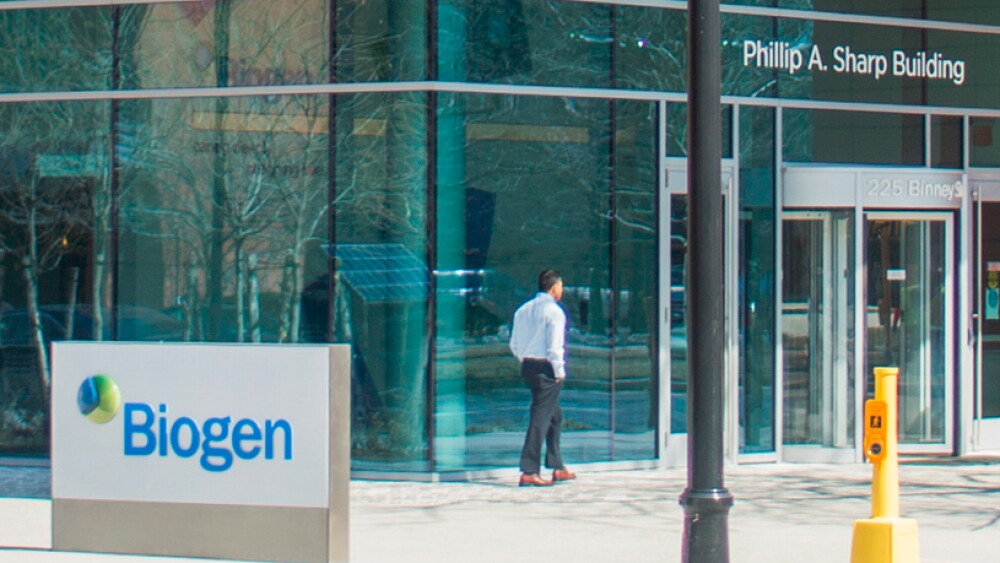April 17, 2017
By Mark Terry, BioSpace.com Breaking News Staff
Cambridge, Mass.-based Biogen is a company that likes to take big chances. When it works, it is generally adored by investors and analysts. When it swings and misses—less so. When the company dominated the multiple sclerosis (MS) space, investors loved the company. But now that they are facing competition in that market, investors for some time wanted the company to either buy something or be acquired by someone.
Allison Gatlin, writing for Investor’s Business Daily, says its desirability as a takeover target has come and gone and is unlikely to come up again for a couple years. Here’s an overview of her arguments.
Multiple Sclerosis
Even as late as 2016, Biogen had a lot of clout in the MS market. It launched Zinbryta with AbbVie), but upcoming products from Roche and Celgene are applying pressure. Notably, Roche’s Ocrevus, which was approved last month for both relapsing-remitting and primary progressive types of MS.
“Both the MS physician and patient communities have been eagerly awaiting the Ocrevus launch,” said Geoffrey Porgess, an analyst with Leerink, reports Gatlin. “The drug’s high efficacy, reasonable safety profile and convenient six-month dosing schedule are all major factors in the drug’s positive reception.”
Biogen is partnered with Roche on Ocrevus, but the royalties are unlikely to offset the battering its Tecfidera is likely to take—and Tecfidera accounts for 40 percent of Biogen’s total product sales. Porgess projects Ocrevus to gain 60 percent of the primary progressive MS market in three to four years.
Celegene’s ozanimod is currently in Phase III trials. Porgess told IBD, “If Celgene wanted to buy a sales force and have something overnight to help sell ozanimod, Biogen could be that company.” But with Roche looming overhead, that’s less likely.
Spinraza
Biogen licensed Spinraza (nusinersen) for spinal muscular atrophy (SMA) in 2013. The drug’s peak sales are projected to be $2 billion and in a very short period of time. The drug was approved on Dec. 23, 2016. It’s the only drug approved for the disease, and it was given a fairly broad label.
“This drug, of all things, should be rapidly adopted and widely reimbursed,” Gatlin reports Porges saying. “And what may have happened was what appeared to be good fortune with the label may have turned into a liability because payers became concerned too many patients would start on the drug so they restricted access.”
The disappointment—if that’s the case, since Biogen won’t release earnings until April 25—is that insurance companies Anthem (ANTM) and Humana have only committed to reimbursing patients with the most severe type of the disease, Type 1. UnitedHealth Group (UNH) has agreed to cover Type 1, 2 and 3 patients. The drug runs $125,000 in the first year.
This pushback from Anthem and Humana has resulted in analysts dropping their expectations, although Biogen’s financials may have another story to tell.
Hemophilia
In February, Biogen spun off its hemophilia franchise into a separate company, Bioverativ. Since then, Bioverativ shares have climbed 27 percent. Porgess’ argument is that any company interested in buying Biogen, may have second thoughts without having access to the hemophilia franchise. He argues that Biogen should also spin off its MS franchise and focus entirely on Alzheimer’s disease.
Alzheimer’s
About two years ago, Biogen announced a strategic pivot toward Alzheimer’s and neurological disorders. A dramatic pivot, it was also a risky one. Alzheimer’s disease is a wasteland where promising drugs go to die. So far, the company’s aducanumab is showing promise in early trials—not all that unusual in Alzheimer’s drugs—but results from two Phase III trials won’t likely be available until at least late 2020. In addition to aducanumab, it also has elenbecestat, a BACE inhibitor.
It’s worth noting that just last week, Biogen licensed from Bristol-Myers Squibb for $300 million upfront and up to $550 million in milestones, plus royalties, as well as a near-term $60 million milestone.
The compound is an antibody that targets extracellular tau, which are the proteins that form tangles in the brain associated with Alzheimer’s disease and other neurodegenerative disorders such as progressive supranuclear palsy (PSP). Biogen plans to quickly launch a Phase II trial of the drug in Alzheimer’s and PSP.
Early in Alzheimer’s, the brain is affected by beta-amyloid plaques. Later in the disease, tau proteins are present. Aducanumab is an antibody against beta-amyloid. Having both Aducanumab, elenbecestat and BMS-986168 opens up the possibility of an effective cocktail of drugs for Alzheimer’s that can also be used in other combinations for other diseases. It also hints at possible treatments for different stages of the disease.
Biogen is an interesting company and in 2016, reported $11.4 billion in revenue, up 6 percent from the previous year. The company’s market cap is about $58.84 billion, which would mean only a select group of large companies could buy it anyway once you tack on a premium. If the Alzheimer’s drugs fail, it’ll be more affordable, but would anyone want to buy it? And if the Alzheimer’s drug succeeds, who could afford it?





